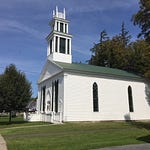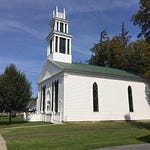Hello Friends,
I trust you’ve had a good two weeks since our last podcast on February 7, God’s Inquiring Gardener. If you’ve not had a chance to do so already, give it a listen or a read when you’ve the time. It’s a sweet story of God’s faithful witness to us.
This week we shift gears, and I focus on a papal “Declaration” that quietly came out over the busyness of the Christmas season. It’s causing quit a stir. “Same-sex blessing” is a subject that has preoccupied me as a playwright for decades, and its implications for Christendom at large cannot be overstated nor ignored.
I’ll be following up today’s podcast with a A Blessing by Any Other Name, Part II on March 6, so feel free to send me any thoughts you might have on Part I. Your comments will be appreciated.
Thank YOU for joining me on “The Church’s One Foundation Is Jesus Christ Her Lord!”
Blessings!
D. Paul
A Blessing By Any Other Name
On this frigid, snowy February morning in Indiana, I’d rather be writing about “Bright copper kettles and warm woolen mittens” than Pope Francis’s controversial “Feducia Supplicans,” translated “Supplicating Trust,” and subtitled “On the Pastoral Meaning of Blessings,” issued by the Holy See’s Diecastery for the Doctrine of the Faith (DDF), December 18, 2023, and subsequently approved with the stroke of a pen by Pope Francis. The Pope’s blessing of the “Declaration,” as it is entitled, is evidenced throughout the document, urging us not to “lose pastoral charity, which should permeate all our decisions and attitudes,” and to avoid being “judges who only deny, reject, and exclude.” We’re then encouraged to “…respond to the Holy Father’s proposal by developing a broader understanding of blessings.” This is the first Declaration issued by the DDF since 2000, and it’s a big deal.
Owing (as a psychologist might analyze me) to my residual anger as a wounded child rocked in the cradle of fundamentalism, I’m having something of a sympathetic response to the Pope’s Feducia Supplicans, which permits priests to bless same-sex couples. Admittedly, that is an oversimplification of the Declaration, for though it allows priests to pastorally bless same-sex couples (and other couples in “irregular situations”), it clearly forbids them to liturgically bless same-sex couples, or to affirm “civil unions, or any procedures that would make the blessing appear like a marriage,” including “clothing, gestures, or words that are proper to a wedding.” Bottom line: a pastoral blessing is okay, but a liturgical blessing is not. This dubious distinction has done little to quiet the dissent coming from the orthodox and conservatives within Catholicism and the Church at large, for the message coming out of the DDF is tortuously confusing— leaving nearly everyone “bewitched, bothered, or bewildered.”
In a fine example of doublespeak, Victor Manuel Fernandez, Prefect of the DDF, said later in an interview that the declaration did not permit blessing the unions, with a DDF press release in January 2024 repeating this position. And yet, in the opening “Presentation” of the Declaration, signed by Cardinal Fernández, he writes: “The value of this document, however, is that it offers a specific and innovative contribution to the pastoral meaning of blessings, permitting a broadening and enrichment of the classical understanding of blessings…. It is precisely in this context that one can understand the possibility of blessing couples in irregular situations and same-sex couples without officially validating their status or changing in any way the Church’s perennial teaching on marriage.” Such parsing—you can bless without validating—gives a new meaning to “becoming all things unto all people.”
Not surprisingly, conservative German Cardinal Gerhard Muller has called the declaration “self-contradictory,” and “sacrilegious and blasphemous.” The schism widens from there, with Cardinal Robert Sarah, a Guinean prelate, describing the blessing of same-sex couples as “a heresy that seriously undermines the Church.” A statement by The Confraternity of Catholic Clergy (USA) reflects the sentiment of thousands of priests and laity around the world: "The Church has not changed her perennial teaching on human sexuality and the sanctity of marriage, but we should neither muddy the waters, either. Admonishing sinners is still a work of mercy and obscuring their moral vision is not; even if it is called a ‘blessing.’"
The Pope’s primary defense to these vigorous rebukes is basically this: “We are blessing the individuals, not the couple.” Granting the Pope the benefit of the doubt, he may earnestly believe that this is how “pastoral blessings” will play themselves out in theory, but it will not be so in practice.
Here’s a hypothetical scenario for us to consider; stay with me, as there’s no punch line: a gay couple (let’s name them Jonathan and David/how original of me) call their local parish and make an appointment to meet with their priest, a Father O’Halloran. Nervously, they arrive ten minutes early but are soon ushered into his spacious office, filling the room with a joyful anticipation. Father O’Halloran greets them warmly and begins by “individuating” his questions:
“David, how’s everything going with your work down at the City Council?” David, who is known by Father O’Halloran as a strong advocate for the LGBTQIA+ community, briefly shares with him the council’s plans for the upcoming Gay Pride Parade. Congratulating David on a job well done, Father O’Halloran turns his attention to Jonathan, who, grinning from ear to ear, reaches out and takes David’s hand, sharing with the wide-eyed priest the details of their private, civil marriage last month.
“We understand why, but we’re still disappointed that the ceremony couldn’t be done here in our church, Father O’Halloran. But now, with Pope Francis’ latest Declaration, we’ve come to ask for your blessing upon our union … well … more than just a union at this point, our marriage.”
What an untenable position—“damned if you do, damned if you don’t”—the good Father O’Halloran finds himself in. He wants to support the welcoming spirit of the Declaration, while still not ignoring its doctrinal directives. But soon, his concerns are put to rest, certain in knowing that it’s not a liturgical blessing he’ll be performing, and comforted by the knowledge that the Declaration does allow “priests and deacons” to perform “spontaneous…pastoral blessings of same-sex couples,” blessings that are “less bound by moral prerequisites.” Caught up in the “freedom” and “spontaneity” of the moment, Father O’Halloran tells Jonathan and David that he is “happy to do so,” and proceeds to give them his unqualified blessing, not just as individuals, but as a couple, employing that well-travelled phrase, “And may you be blessed on your journey together.”
Millions, of course, within the Catholic Church and elsewhere, see this as a positive step, making God’s “unconditional love” more accessible to the gay community. According to Archbishop Franz Lackner of Salzburg, the document basically means that “one can no longer say no” to blessing same-sex unions. James Martin, an American Jesuit priest, called the declaration “a major step forward in the church’s ministry to LGBTQ people,” and demonstrated that by blessing a married same-sex couple the following day. And in Belgium, Antwerp Bishop Johan Bonny, praised the decision as “moving towards” recognizing same-sex sacramental marriage in the Catholic Church. Bishop Bonny is right in his assessment, “and there’s the rub.” Same-sex blessing has never been the long-term goal, but always an intermediary one. It has served the progressive Church activists as a means to their ultimate goal—same-sex marriage—the coveted prize waiting at the sacramental altar, sealed by those joyful yet solemn words, “I now pronounce you husband and wife,” or whatever variant is suitable to the occasion.
Despite the Pope’s good intentions as expressed in the Declaration—Indeed, these blessings are given…as an expression of the Church’s maternal heart…to open one’s life to God—the Church’s acceptance of same-sex blessings will function more like a mild opiate, putting the Church in a morally, semi-comatose state, leaving the activists restless, longing, and working until “full-inclusion” is achieved. Perhaps this morally somnolent state is best expressed in the “Filial Appeal,” signed by 90 Catholic priests, scholars, and authors, who concluded: “In practice, the faithful will not even be aware of the subtle theoretical justifications introduced by the Declaration…,” adding, “The message that is effectively launched, and that the people of God, and the entire world, will inevitably register and are already registering is that: The Catholic Church has finally evolved, and now accepts homosexual unions, and, more generally, extramarital unions.” Accurately pointing out that a blessing “always implies an approval of what is being blessed,” the signatories of the “Filial Appeal” are asking all leaders in the Church to forbid same-sex blessings and courageously calling on Pope Francis, for the sake of the Church and his papacy, to withdraw the Declaration.
So, my brothers and sisters in Christ, we and the entire Church are divided on this, aren't we. The schism is deep, with fragile fault lines running through every denomination. The question is: how then shall we respond?
That’s what we will explore on our next podcast—A Blessing By Any Other Name, Part II, episode #21 of “The Church’s One Foundation,” to be published on March 6, 2024.
Till then, blessing upon blessing to you.
Amen
PS: In anticipation of our podcast on Wednesday, March 6, I invite you to read the Declaration, which can be found at: https://www.vatican.va/roman_curia/congregations/cfaith/documents/rc_ddf_doc_20231218_fiducia-supplicans_en.html#_ftnref22
“The Church’s One Foundation Is Jesus Christ Her Lord!”














Share this post